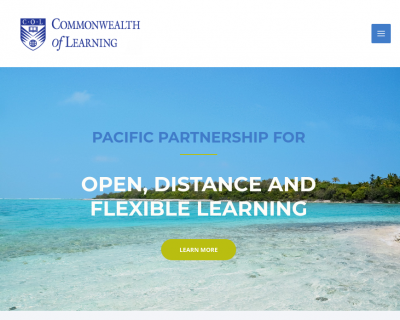QA4ODFL2/About
This section provides information about the Pacific Partnership for Open, Distance and Flexible Learning, and the Quality Assurance for Open Distance and Flexible Learning 2 (QA4ODFL2) online course.
Contents
[hide]About the Pacific Partnership for Open, Distance and Flexible Learning
Partnership for Open, Distance and Flexible Learning (ODFL) in the Pacific is a 5-year project (2020 – 2025) funded by the New Zealand Ministry of Foreign Affairs & Trade to support enhancing capacity and efficiency of education sectors in the Pacific through greater use of innovative delivery mechanisms and technology.
The Commonwealth of Learning (COL), together with the Pacific Centre for Flexible and Open Learning for Development (PACFOLD) are implementing the initiative.
About the QA4ODFL2 online course
Quality Assurance for Open Distance and Flexible Learning 2 (QA4ODFL2) was developed by Saide [1] for the Pacific Partnership for Open, Distance and Flexible Learning.
Summary
| Course code | QA4ODFL2 |
| Duration | 4 weeks |
| Workload | 5 - 6 hours per week |
| Certification | Certificate of Participation |
| Badges | Course Completion Badge |
Introduction
This course is aimed at enhancing the capacity of senior education officials in Pacific Island countries to manage quality assurance of Open, Distance and Flexible Learning (ODFL). Due to increasing demand of education and the prevalence of educational technology, many countries are moving towards mainstreaming ODFL to meet demand. The experience of COVID-19 pandemic has also demonstrated that ODFL provides more resilient forms of schooling than a conventional face-to-face mode of delivery. In the Pacific Island countries in particular, natural disasters like volcanic ash and tsunamis are common occurrences that pose challenges to normal school programmes. ODFL has great potential to sustain learning under such difficult conditions. Because of the limited investment needed in building physical structures and putting in place campus facilities for use by students, ODFL tends to be more cost effective than conventional face to face schooling. This means ODFL can provide greater access.
Despite a long and generally successful track record, there is still work to be done to enhance the quality of ODFL to show that the quality of student learning is at least equivalent to face-to-face teaching. This is particularly true where ODFL is relatively new. It is against this background that the Commonwealth of Learning (COL) is investing in developing capacity to implement effective quality assurance systems in ODFL in the Pacific Island countries.
What will I learn?
In this short online course you will:
- Select and align appropriate curriculum content;
- Design and implement appropriate assessment;
- Consider appropriate HR strategies for open schooling;
- Identify and implement appropriate communication strategies to support learners in open schooling;
- Advise on most appropriate technologies that can be harnessed to leverage the quality of ODFL in your context; and
- Evaluate the content of ODFL provisioning in your country or any country in your region, including assessment, human resourcing and learner support mechanisms used.
Structure of the course
Quality assurance cuts across all aspects of any educational system and it is important for all stakeholders in an institution to appreciate this fact. This short course will give guidelines on how to enhance quality through course content and design, learner support and assessment, provision of appropriate and sufficient human resources, and sound management and administration of open schooling practices. You will conduct regular self-evaluation exercises in each unit, to encourage you to continually reflect on what you learn. You will also be required to do at least one assignment at the end of each Unit. These assignments will be done in Moodle and the marking will be automated.
Acronyms
| Abbreviation | Explanation |
|---|---|
| COL | Commonwealth of Learning |
| CPD | Continuous Professional development |
| GDP | Gross Domestic Product |
| ICT | Information Communication Technology |
| ILO | International Labour Organisation |
| LCDs | Least Developed Countries |
| NAMCOL | Namibian College of Open Learning |
| ODFL | Open, Distance and Flexible Learning |
| ODL | Open and Distance Learning |
| SDL | Self-Directed Learning |
| SWOT | Strength, Weaknesses, Opportunities and Threats |
| TEL | Technology–enabled Learning |
What's involved
This is a hands-on, activity-based course consisting of 4 Units. It is anticipated that you need 30 hours (4 weeks) to go through the whole course. The 30 hours can be spread over a period of 1 to 3 months, depending on the commitments you have. The 4 units cover: Course and Content Development, Assessment as Learner Support, Human Resource Strategy, and Management and Administration for Student Support in ODFL.
Certification options
Participant certificate
If you complete the Learning quiz at the end of the course and get at least 50%, you will be awarded a QA4ODFL2 Certificate of participation.
QA4ODFL2 Course Completion badge
If you complete the Learning quiz at the end of the course and get at least 70%, you will also automatically earn the QA4ODFL2 Course Completion badge.
Prerequisites
Any teacher is free and welcome to participate in this course. The course will be conducted in English. We recommend that you have:
- Access to a personal computer for 5 – 6 hours per week
- Basic computer skills (saving files in different formats, setting up and deleting folders, starting programs, etc.)
- Access to the internet for 3 – 5 hours per week while working online on the course.
- Basic skills in navigating websites using a browser
- Ability to install, or have access to a colleague or friend to help you install Free and Open Source Software programs (we will provide links to free downloads of the software).
